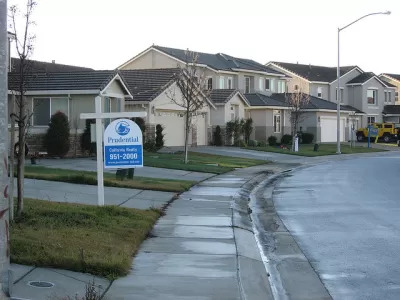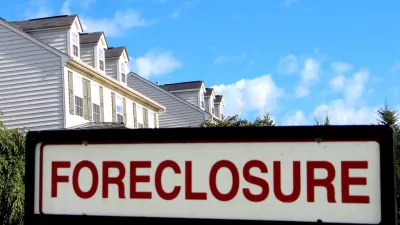The housing market has yet to devolve like in 2008, thanks to a federal safety net put in place in March, but a wave of foreclosures is still a possibility as protections begin to expire.

The Federal Housing Finance Agency (FHFA) has been insulating the U.S. housing markets since March with measures like a foreclosure moratorium for federally backed mortgages and forbearance for homeowners experiencing financial hardship during the pandemic.
But the foreclosure moratorium is set to expire in August, according to an article by Jeff Andrews, risking a wave of foreclosures like during the Great Recession. That expiration data comes with the additional risk presented by a rising mortgage delinquency rate among homeowners. "In January, just 3.22 percent of mortgages were in delinquency. By May, that number shot up to 7.76 percent — about three points shy of where the delinquency rate peaked during the financial crisis of 2008, which was at 10.57 percent," reports Andrews.
There's no need to panic yet, according to Andres. The forbearance protection will last for a year, but even that extra protection will run out eventually, if the economic effects of the pandemic lingers in the United States into 2021.
Meanwhile, protections offered by the federal government to low-income renters have already expired last week, sparking concern about a coming wave of evictions and increasing homelessness.
FULL STORY: A Foreclosure Crisis Could Still Happen

Planetizen Federal Action Tracker
A weekly monitor of how Trump’s orders and actions are impacting planners and planning in America.

Restaurant Patios Were a Pandemic Win — Why Were They so Hard to Keep?
Social distancing requirements and changes in travel patterns prompted cities to pilot new uses for street and sidewalk space. Then it got complicated.

Map: Where Senate Republicans Want to Sell Your Public Lands
For public land advocates, the Senate Republicans’ proposal to sell millions of acres of public land in the West is “the biggest fight of their careers.”

Maui's Vacation Rental Debate Turns Ugly
Verbal attacks, misinformation campaigns and fistfights plague a high-stakes debate to convert thousands of vacation rentals into long-term housing.

San Francisco Suspends Traffic Calming Amidst Record Deaths
Citing “a challenging fiscal landscape,” the city will cease the program on the heels of 42 traffic deaths, including 24 pedestrians.

California Homeless Arrests, Citations Spike After Ruling
An investigation reveals that anti-homeless actions increased up to 500% after Grants Pass v. Johnson — even in cities claiming no policy change.
Urban Design for Planners 1: Software Tools
This six-course series explores essential urban design concepts using open source software and equips planners with the tools they need to participate fully in the urban design process.
Planning for Universal Design
Learn the tools for implementing Universal Design in planning regulations.
Heyer Gruel & Associates PA
JM Goldson LLC
Custer County Colorado
City of Camden Redevelopment Agency
City of Astoria
Transportation Research & Education Center (TREC) at Portland State University
Camden Redevelopment Agency
City of Claremont
Municipality of Princeton (NJ)





























